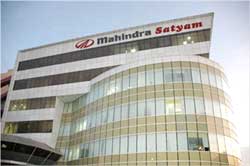 | « Back to article | Print this article |
The Supreme Court on Monday censured Mahindra Satyam, formerly Satyam Computer, for writing to the government adopting the tone of "arrogance" in the case relating to Rs 617 crore (Rs 6.17 billion) income tax demand, which is being re-assessed by the tax authorities.
Asking the company to withdraw the letter, the apex court expressed displeasure at its tone and tenor that indicated as if Satyam was dictating an order to the Central Board of Direct Taxes. The court said the company had misinterpreted the assurance of the tax department that it would set aside its earlier order seeking Rs 617 crore in Income Tax.
The court said the company had misinterpreted the assurance of the tax department that it would set aside its earlier order seeking Rs 617 crore in Income Tax.
"You cannot do this in such manner. Instruct them (Satyam) to withdraw the letter. This is not the way," a three-judge bench headed by Chief Justice S H Kapadia said when senior advocates Harish Salve and Abhishek Manu Singhvi, were making submission for the IT firm.
Among other things, the bench took exception to the use of word "shall", written more than once in the letter.
Attorney General G E Vahanvati raised strong objection to the letter saying that it was "highly offensive" and was like dictating order to CBDT.
Sensing the mood of the court, the senior advocates steered clear of the controversy and said the letter was not drafted by them, and they had not seen it.
"We have not seen it. We want to withdraw it and apologise for it. This is not the way the letters are to be written," they said, indicating that it was the work of some junior advocate.
The bench said, "We are quite sure that you have not seen the letters otherwise it would not be so. The present generation is very competitive but is crippled with arrogance."
The court has adjourned the matter to Friday.
The apex court was hearing the plea of the IT firm to defreeze its bank accounts, worth Rs 1,300 crore (Rs 13 billion), by CBDT.
On April 8, CBDT had informed the court that it would set aside its order directing the company to deposit Rs 617 crore.
Attorney General G E Vahanvati, appearing for CBDT, had told the apex court that it would recall its March 10, 2011 order, challenged by Satyam on the ground that calculations were based on fictitious accounts of the previous management, led by disgraced founding chairman B Ramalinga Raju.
In January 2008, Raju confessed to over Rs 7,000 crore (Rs 70 billion) accounting fraud at the company he founded. It was later bought over, through bidding, by the Mahindras.
The counsel appearing for Satyam had requested the court to defreeze the company's accounts. It said it urgently needed the money as in a recent negotiation it has paid around 10 million USD to Securities and Exchange Commission (SEC) of USA for overstating the company's revenue, income and cash balances.
"We are not going to solve this problem now. Your main grievance was that you were not heard before passing such an order," the bench had said, adding that it would be addressed.
The Satyam counsel had submitted, "We also have to pay the salaries of the employees for the next month and have some liabilities also."
However, Vahanvati opposed the company's plea, saying it already has cash reserves of Rs 1,800 crore (Rs 18 billion).
"Let the money remain with us. After that revised process if they are entitled, we will refund them," said Vahanvati.
Based on this position, Satyam's counsel requested the apex court to put the money in an escrow account.
In response, the bench assured the IT firm, saying its interest would be protected. "You would be protected," it said.
Satyam moved the court after an order by the Andhra Pradesh high court, directing it to deposit Rs 350 crore (Rs 3.5 billion) along with a bank guarantee of Rs 267 crore (Rs 2.67 billion) to the tax authorities.
The CBDT claim was based on Rs 345 crore (Rs 3.45 billion) foreign tax credit availed by the former management of the company.
The tax demand climbed to about Rs 616 crore (Rs 6.16 billion) after the imposition of interest and penalties.